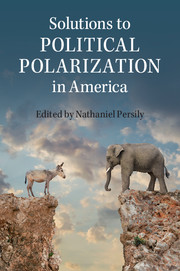Book contents
- Frontmatter
- Dedication
- Contents
- Contributors
- Introductory Chapters
- Reforming the Electoral System
- Strengthening Parties
- Empowering and Informing Moderate Voters
- Lowering Barriers to Policy Making
- 14 Beyond Confrontation and Gridlock: Making Democracy Work for the American People
- 15 American Political Parties: Exceptional No More
- 16 Partisan Polarization and the Senate Syndrome
- 17 Finding the Center: Empowering the Latent Majority
- 18 Making Deals in Congress
- 19 Helping Congress Negotiate
- 20 Staying Private
- Index
- References
18 - Making Deals in Congress
from Lowering Barriers to Policy Making
Published online by Cambridge University Press: 05 May 2015
- Frontmatter
- Dedication
- Contents
- Contributors
- Introductory Chapters
- Reforming the Electoral System
- Strengthening Parties
- Empowering and Informing Moderate Voters
- Lowering Barriers to Policy Making
- 14 Beyond Confrontation and Gridlock: Making Democracy Work for the American People
- 15 American Political Parties: Exceptional No More
- 16 Partisan Polarization and the Senate Syndrome
- 17 Finding the Center: Empowering the Latent Majority
- 18 Making Deals in Congress
- 19 Helping Congress Negotiate
- 20 Staying Private
- Index
- References
Summary
There is one unavoidable fact about legislating in a democratic system. No single person, faction, or interest can get everything it wants. Legislating inevitably means compromising, except in the rare circumstances when consensus is so strong that one dominant view can prevail with ease.
Robert Kaiser 2013, p. 174
Compromise may be the “unavoidable fact” about legislating in a democratic system. Yet, scholars have few systematic answers to this question: How do legislators “get to yes”? To put the question in language more familiar to students of politics: How do politicians with diverse, often-conflicting interests and policy preferences reach agreements on public policy in a legislative body of co-equals? In this chapter, we offer a perspective on deal making in the contemporary Congress, highlighting the impact of political and partisan considerations on lawmakers' abilities to secure policy agreements.
Negotiation in Congress is never solely about policy: politics and policy are always intertwined. Congressional negotiations thus differ from those in the private sector, in which actors seek to maximize benefits and minimize costs and the substantive terms of an offer are paramount. Congressional deal making occurs in a political context that shapes the willingness of party leaders and their “rank and file” to negotiate at all or to accept even favorable offers. Lawmakers must justify votes and policy compromises to their constituencies, whereas party leaders must attend to key groups in the party coalition and to the party's public image. Given the political context of congressional negotiations, we evaluate the tools and institutional arrangements that make deals in Congress more likely – emphasizing that conflicting incentives and interests place a premium on negotiating out of the public eye. We conclude with a broader assessment of the prospects for negotiation in a party-polarized Congress.
DISTRIBUTIVE VERSUS INTEGRATIVE MODELS OF NEGOTIATION IN CONGRESS
Negotiation theorists typically distinguish between distributive and integrative solutions to public problems (see Chapters 4 and 5). Distributive solutions involve zero-sum bargaining over extant benefits.
- Type
- Chapter
- Information
- Solutions to Political Polarization in America , pp. 240 - 261Publisher: Cambridge University PressPrint publication year: 2015
References
- 8
- Cited by



